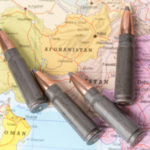Senator Asks International Criminal Court to Investigate Australian Commanders Over War Crimes

The deputy leader of the Palmer United Party, Jacqui Lambie, announced in the Senate yesterday that she has asked the International Criminal Court (ICC) to investigate Australian Defence Force Commander over war crimes committed in Afghanistan.
Her statement has been met with mixed responses, with some calling her unpatriotic while others see her actions as warranted given the inaction of the Federal Government and the Australian Federal Police (AFP) over the findings of the 4-year long Brereton Inquiry.
The Inquiry’s final report was released three years ago and recommended the investigation of 36 potential war crimes perpetrated by 19 Australian soldiers in 23 incidents in Afghanistan, as well as systemic changes.
Prosecuting truth tellers while taking no action against alleged war criminals
Former Australian Defence Force Lawyer David McBride was the person to whom Australian soldiers – appalled by the actions of people like Ben Roberts- reported the alleged war crimes.
Mr McBride brought these reports to the attention of his superiors, only to be ignored.
Given the inaction of the ADF’s top brass, Mr McBride showed courage and great moral character by bringing the reports to the attention of ABC journalists, which informed The Afghan Files, a programme that aired in 2017.
That programme brought what was really going on in Afghanistan to the attention of the Australian public, which certainly deserved to know what was happening in their names.
This, in turn, led to the Brereton Report and the exposure of alleged war crimes.
For bringing the truth to the public’s attention, Mr McBride was criminally prosecuted and is currently facing a trial and the potential of going to prison.
Meanwhile, the AFP neglected to prosecute alleged war criminals.
For its reporting, the head offices of the ABC in Sydney were raided by the AFP.
So, it seems, our nation is one that prosecutes truth-tellers and ignores the conduct of those alleged by an exhaustive investigation by a highly respected former judge to be potential war criminals.
In fact, only one Australian soldier has so far been criminally prosecuted over alleged crimes, being SAS veteran Oliver Schulz who was captured on video hunting down and murdering an unarmed Afghan who was cowering in a field in 2002. Schulz was only recently charged despite the horrific footage being aired years ago.
And then there’s Australia’s most decorated living soldier, Victoria Cross recipient Ben Roberts-Smith.
The Ben Roberts-Smith case
Early this month, the Federal Court Roberts-Smith, was not defamed by media which reported that he was a war criminal, murdering unarmed civilians in Afghanistan.
To be clear, the Federal Court’s determination is not a finding of guilt. But the case itself – much of the testimony presented throughout is now on the public record – did provide significant evidence to warrant further investigation of misconduct.
Ben Roberts-Smith maintains his innocence despite a lot of damning evidence to the contrary and has steadfastly refused to apologise to the Afghan families of his victims or others affected by his actions while serving in the country.
While Australia has a culture of lauding and applauding ‘the diggers’, those who have fought for Australia, the actions of some Australian soldiers, as we have come to know of them, were cold, calculated and definitely worthy of further scrutiny.
The investigation and prosecution of war crimes in Australia
The investigation and prosecution of war crimes is the responsibility of each individual country involved in conflict.
The International Criminal Court has the power and jurisdiction to step in if asked to do so, or when it is determined that a specific country is not taking appropriate action over war crimes.
There are rules of engagement and the deliberate killing or torturing of civilians is considered a crime.
Under international law, defence force commanders can be held criminally responsible for war crimes they knew about, or reasonably should have known about, but did not prevent.
The decision by John Howard’s Government to send Australian troops to Afghanistan in 2001, as part of Australia’s mission to combat international terrorism, to stabilise Afghanistan, and to support Australia’s international alliances, has been controversial right.
In some legal circles thas been argued that Australians were in Afghanistan illegally anyway.
This begs the question – has the Australian Government betrayed Australian troops? Many accounts from returning soldiers suggest that they were left under stressful conditions and neglected. Many have come home traumatised, and with PTSD. Others have publicly stated that they feared speaking out about what was occurring in Afghanistan because of the Defence Force’s toxic boys’ club culture of bullying, silence and coverups.
Justice needs to be served, McBride set free
As stated David McBride, who did actually speak out about the atrocities conducted by Australian soldiers in Afghanistan, continues to be criminally prosecuted.
He faces more than five charges including the unauthorised disclosure of information, theft of commonwealth property and breaching the Defence Act, punishable by decades in prison if he is found guilty.
He is due to face trial in November, despite repeated calls for the prosecution to be dropped, particularly since the information published in the Brereton Report validates the information he originally gave to ABC journalists, believing that the Australian public deserved to know what was occurring in Afghanistan.
Australians do have a right to know what really happened, and, where necessary, for those responsible to be held to account. Justice needs to be served – not just for the thousands of Australians who have fought honourably, but in order for us to redress our tarnished reputation on the international stage.
In the meantime, whether or not the International Criminal Court will act remains to be seen, but Senator Lambie has certainly got the Government’s attention.
By writing to the ICC, she has compelled Defence Minister Richard Marles to front up. He has told the media that the Government will seek to implement the recommendations made by the Brereton Repot.
This is important, particularly in light of the fact that the Albanese Government recently pledged more than $50 million to defence in the 2023/24 budget.
It’s critical that Australians have confidence that this money is handled appropriately by those in senior positions who are responsible for administering it.







